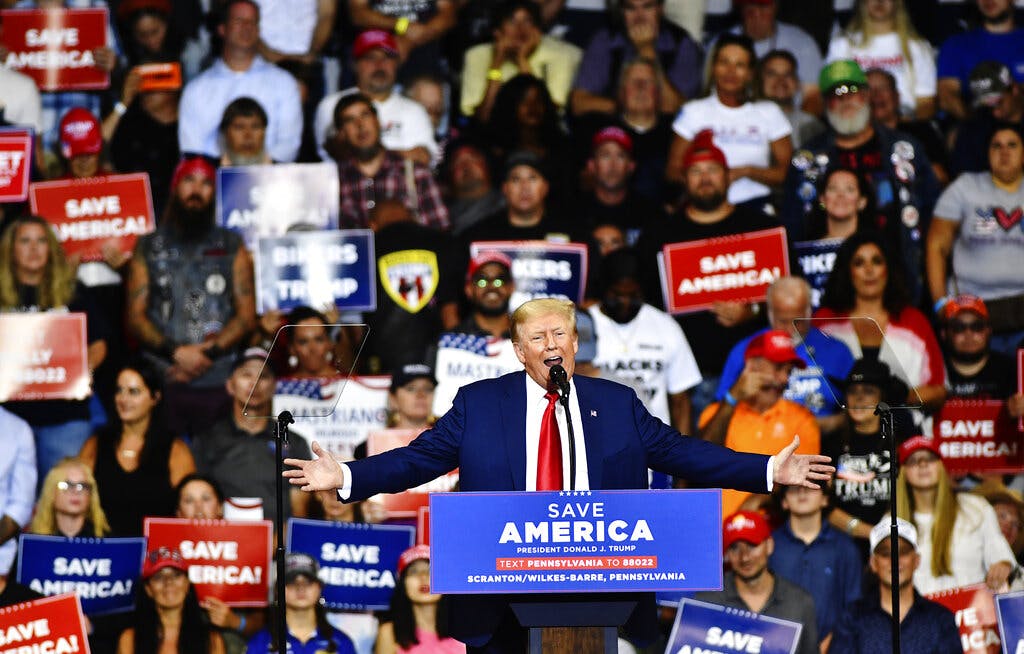Donald Trump and the Case of the Silent Witnesses
Jack Smith’s Case against the former president could hinge on secret documents too sensitive for a public trial.

What happens when the Constitution’s requirement for a public trial clashes with some of the country’s most closely guarded secrets? That is the question that Special Counsel Jack Smith’s indictment of President Trump — and his looming trial — brings into focus, as records accustomed to secrecy will take their turn in the Florida sunshine.
To convict Mr. Trump, the government will have to risk the public — and, potentially, foreign adversaries — taking a gander at the very records that have landed Mr. Trump in the dock. This creates something of a bind for the erstwhile war crimes prosecutor, who needs to disclose enough to convict Mr. Trump but not compromise America’s security.
That, of course, is the harm of which Mr. Trump stands accused across a panoply of counts: Mr. Smith’s indictment notes that the materials found at Mar-a-Lago could “put at risk the national security of the United States.” So, potentially, could a trial where those same documents circulate among a jury, counsel for both sides, Judge Aileen Cannon, and potentially, the public.
Mr. Trump, though, is not the first criminal defendant to stand accused of mishandling secrets. A doctrine called the “silent witness” — used by district courts for decades, but blessed by only a single appellate one — has emerged as a rough recipe to handle this genus of trial.
The silent witness rule sets a procedure whereby sensitive evidence is disclosed to the jury and the trial’s other participants but not to the public. In open court, those participants would, say, substitute letters for country names or otherwise refer to the contents of the documents in question in low-fi resolution.
That appellate case that blessed the silent witness rule, U.S. v. Mallory, emerged from the United States Court of Appeals for the Fourth Circuit, whose terrain encompasses the FBI and CIA. A district court convicted Kevin Mallory of conspiring to transmit national defense information to a Chinese agent and lying to the FBI.
Mallory appealed, arguing that the district court’s use of the silent witness rule was crosswise with the Sixth Amendment’s promise of a “public trial,” the Fifth Amendment’s Due Process clause, and the Confrontation Clause, also sourced to the Sixth Amendment. In other words, the silent witness rule hampered his ability to mount a full defense.
A unanimous panel of riders disagreed, calling the silent witness rule a “technique by which the parties present classified information to each other, to the jury, and to the court but not to the public.” Unlike Mr. Trump’s case, Mallory’s involved publicly available documents — he conceded that on classified materials, the silent witness rule was in order.
The question of whether the silent witness rule compromises issue has not reached the Supreme Court, and the Fourth Circuit’s ruling will not bind Judge Cannon, who owes deference to the Eleventh Circuit. The Constitution, though, makes clear that a public trial, and a speedy one, is a right belonging to the “accused” — Mr. Trump — and not to the prosecutor.
If Mr. Trump were to push for public disclosure — he has been outspoken in discussing the case on both Truth Social and on television interviews, and he is the leading contender for his party’s presidential nomination in 2024 — he would likely to make a constitutional argument that approximates Mallory’s.
In Waller v. Georgia, the Supreme Court held that there is a presumption in favor of open trials, but that the “right to an open trial may give way in certain cases to other rights or interests, such as the defendant’s right to a fair trial or the government’s interest in inhibiting disclosure of sensitive information.”
The Supreme Court has discerned this presumption in favor of openness in the First Amendment, mandating in 1980 that the press and public are entitled to attend criminal trials and that a “presumption of openness inheres in the very nature of a criminal trial under our system of justice.”
Writing for the majority, Chief Justice Burger noted that the “right of access to places traditionally open to the public, as criminal trials have long been, may be seen as assured by the amalgam of the First Amendment guarantees of speech and press; and their affinity to the right of assembly is not without relevance.”
In Waller, the justices argue that “judges, lawyers, witnesses, and jurors will perform their respective functions more responsibly in an open court than in secret proceedings.” Elsewhere, they note that secret tribunals recall “the Spanish Inquisition,” the “excesses of the English Court of Star Chamber” and the “French monarchy’s abuse of the lettre de cachet.”
While asserting that the right to a public trial is “foundational,” the Mallory court added that is “not absolute.” There are some circumstances — like threats to national security — in which “closing the courtroom to the public is justified and does not amount to a violation of the right.” Any finding to that effect by Judge Cannon with respect to Mr. Trump’s trial is likely to face pushback from not only the former president, but also the press.
Mr. Smith could argue, though, that the silent witness rule, as opposed to abrogating the public’s access, actually preserves it by allowing the trial to transpire in open court, albeit in camouflaged form. The alternative to deploying the silent witness rule could be bolting the courthouse doors altogether.
Even if Judge Cannon allows the silent witness rule and admits the public and press into her courtroom, it is unlikely the country will be able to watch in real time. Local rules governing Florida federal court, prohibit “all forms” of “photographing, audio- or video-recording, broadcasting or televising within the environs of any place of holding court in the District.”

